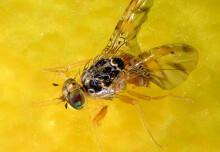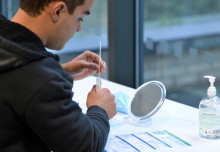

Here’s a batch of fresh news and announcements from across Imperial.
From research exploring why female sparrows might cheat, to a study that investigated how morphine can reduce coughing in patients, here is some quick-read news from across Imperial.
Pick me
 Picky female sparrows may be more unfaithful, new Imperial research suggests. Cheating on social partners is common in birds, and there are clear benefits to males who can raise more offspring without investing in their care. For females, however, the drivers are less obvious.
Picky female sparrows may be more unfaithful, new Imperial research suggests. Cheating on social partners is common in birds, and there are clear benefits to males who can raise more offspring without investing in their care. For females, however, the drivers are less obvious.
The researchers tested if females who swap mates (divorce) more often were also more likely to cheat on their partners and produce young, known as ‘extra-pair offspring.’ They monitored the divorce rates of female house sparrows Passer domesticus, and the paternity of their young, finding females who swap mates more frequently were also more likely to cheat – but did not have greater proportions of extra-pair offspring. This implies that genes controlling female mate choice may also control infidelity.
Jamie Dunning, lead author and PhD student from Imperial’s Department of Life Sciences, said: “Although it is common for female birds to cheat on their partners in the wild, why they do this has long been debated. Here we tested if genes that control infidelity may also control other behaviours, like switching social mates. The results here are a good step towards a better understanding on this intriguing social behaviour.”
The paper ‘Divorce is linked with extra-pair paternity in a monogamous passerine’ was published in the Journal of Avian Biology.
Morphine treatment
 A low and controlled dose of morphine may reduce coughing from idiopathic pulmonary fibrosis, according to new Imperial research.
A low and controlled dose of morphine may reduce coughing from idiopathic pulmonary fibrosis, according to new Imperial research.
The condition causes scarred lungs and breathing becomes increasingly difficult, and up to 85% of patients suffer with chronic coughing.
Researchers measured cough frequency in people with the condition aged between 40 and 90, who were administered a controlled-release dose of morphine or a placebo over two weeks. They found morphine reduced awake cough frequency by almost 40%, while the placebo did not reduce cough frequency. There were no documented withdrawal symptoms during the study or follow-up period – but 40% of patients did report side effects, including constipation and nausea.
Professor Philip Molyneaux, corresponding author from Imperial’s National Heart and Lung Institute, said: “We need better treatments to improve the quality of life of people with idiopathic pulmonary fibrosis. Unfortunately, the disease is progressive, and even though some treatments can slow down scarring, they will not stop or reverse it. It's good to see that morphine shows promise to alleviate coughing in these patients as it can have a negative impact on their day-to-day life.”
The paper ‘Morphine for treatment of cough in idiopathic pulmonary fibrosis (PACIFY COUGH): a prospective, multicentre, randomised, double-blind, placebo-controlled, two-way crossover trial’, was published in The Lancet Respiratory Medicine.
Imperial scientist wins ERC Synergy Grant

An Imperial scientist has won a prestigious ERC grant to study the communication between mobile genetic elements. Professor José Penadés from the Department of Infectious Disease is investigator of this project alongside Professor Avigdor Eldar from Tel-Aviv University, Israel and Professor Alberto Marina at IBV-CSIC, Spain.
It has recently been discovered that bacterial viruses (phages) show social attributes and can communicate using a peptide-based system called arbitrium. In the newly funded TalkingPhages project, researchers hope to discover more about how bacterial viruses (phages) communicate and establish the molecular understanding used by artbitrium systems and how this shapes bacterial ecology and evolution. The research has been funded for €9 million over six years. Phages play a crucial role in steering bacterial evolution, so this project hopes to provide a deeper understanding which will help further research into how to prevent the emergence of pathogenic bacteria.
Professor José Penadés said: “This project opens up a new avenue of research, delving into the intricate communication among bacterial viruses and other mobile genetic elements. Understanding these communications is crucial for unraveling the emergence of novel, virulent, and resistant bacterial clones.”
Read more about the ERC synergy grants.
Image credit unless otherwise stated: Shutterstock

Want to be kept up to date on news at Imperial? Sign up for our free quick-read daily e-newsletter, Imperial Today.
Supporters

Article text (excluding photos or graphics) © Imperial College London.
Photos and graphics subject to third party copyright used with permission or © Imperial College London.
Reporters

Meesha Patel
Faculty of Medicine Centre

Contact details
Tel: +44 (0)20 7594 7909
Email: meesha.patel17@imperial.ac.uk
Show all stories by this author
Bryony Ravate
Communications Division




Leave a comment
Your comment may be published, displaying your name as you provide it, unless you request otherwise. Your contact details will never be published.